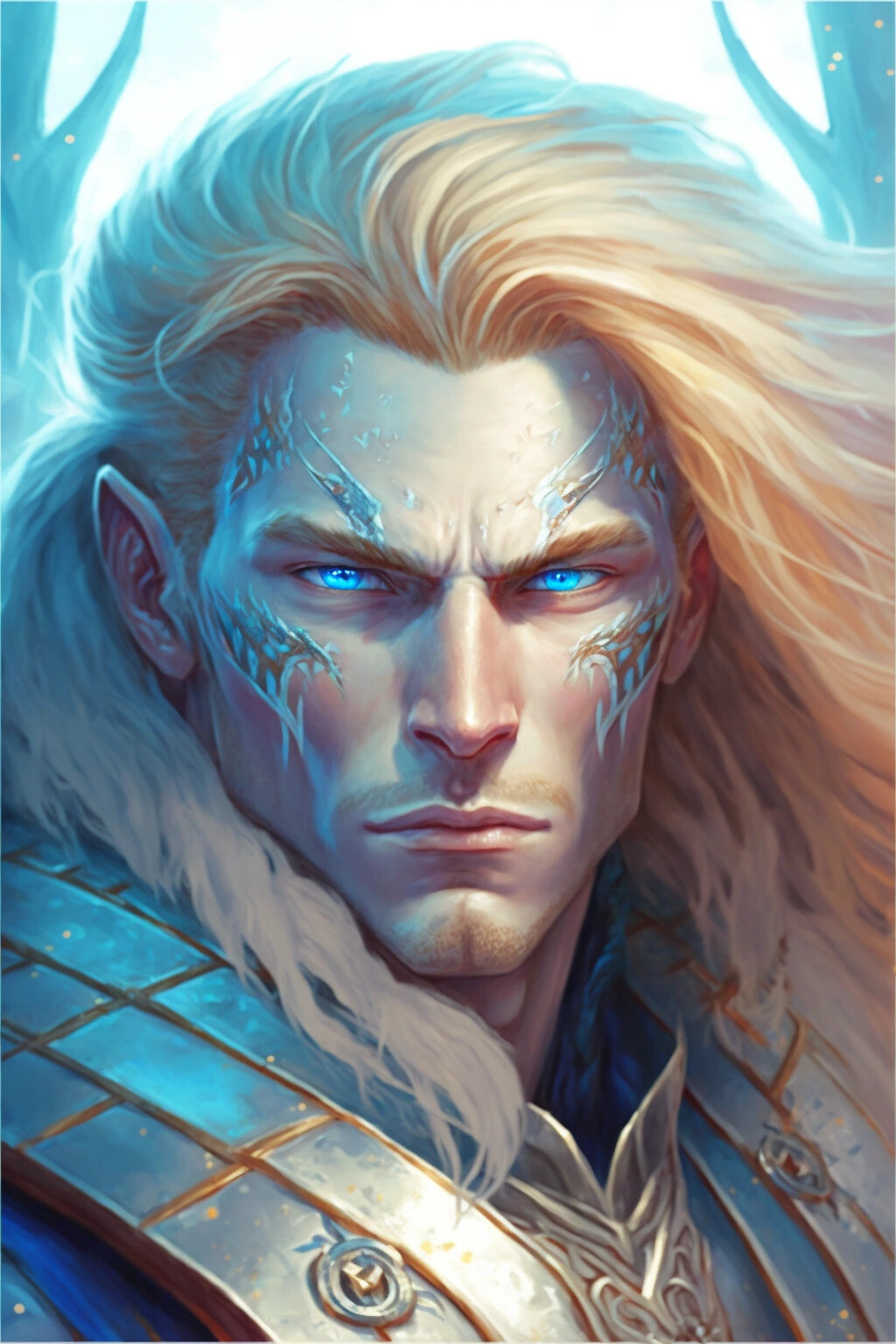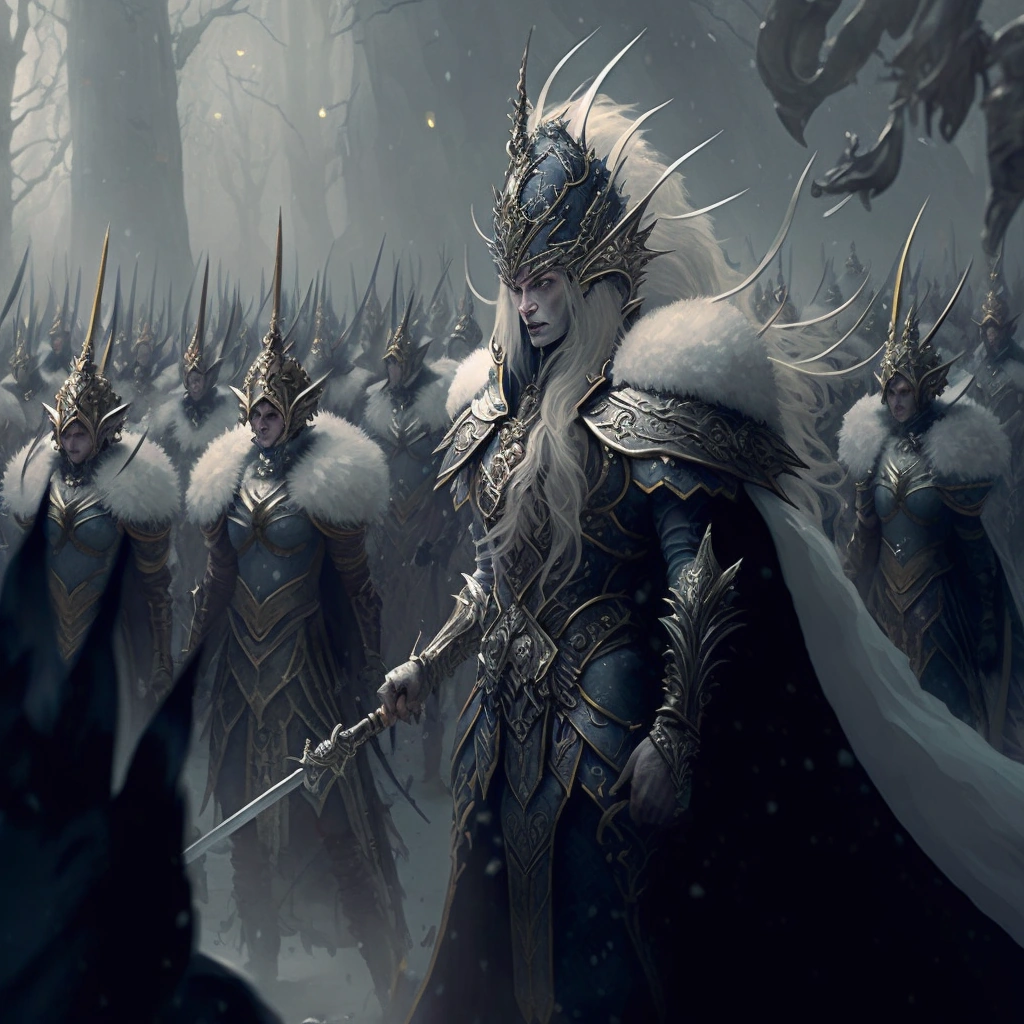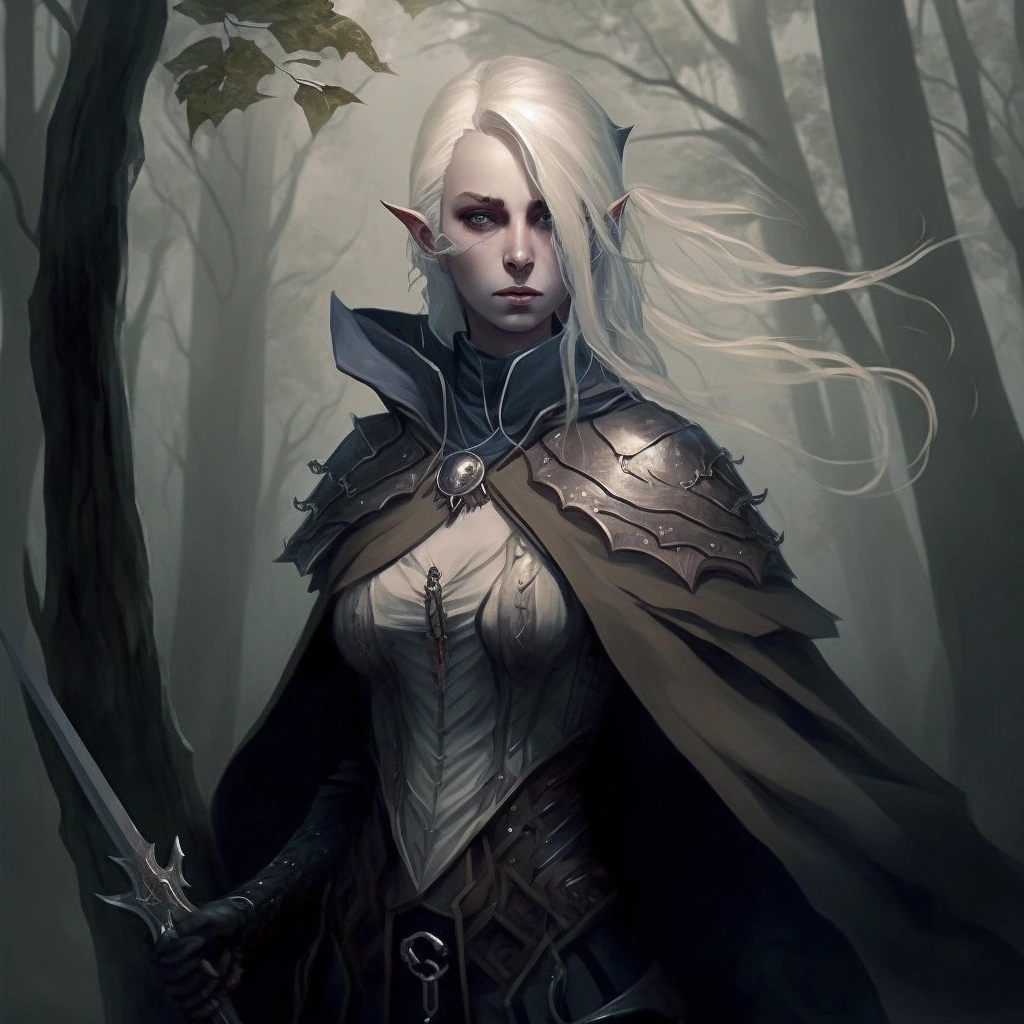Winter Elf (4e Race)
Winter Elf[edit]

|
|---|
| Snow Elves Fantasy lore (AI Generated) [1] |
Winter Elves hail from cold territory, and as a result have a natural proclivity towards cold and winter environments.
| Racial Traits |
| Average Height: 5'3 to 6'2 |
| Average Weight: 90-200 pounds |
| Ability Scores: +2 to Wisdom, +2 to Dexterity or +2 to Strength |
| Size: Medium |
| Speed: 6 squares |
| Vision: Dark vision |
| Languages: Common, Elven |
| Skill Bonuses: +2 to Endurance, +2 to Perception |
| Feytouched: Your ancestors were native to the Feywild, so you are considered a fey creature for the purpose of effects that relate to creature origin |
| Winterkin: Due to your natural affinity towards the cold, you gain a 5 + 1/2 your level resistance to cold damage and effects. |
| Winterhaven: You hale from winter territory, and as a result have natural traits which suit you in your winter environment, and your family. You are good at passing these learned traits on to allies, and so you grant each non Winter Elf ally within 10 squares of you a +1 bonus to endurance checks. |
| Frost Step: When you shift, you may increase the distance you shift shift by 1 extra square. In addition, you ignore difficult terrain when you shift or move (even if you have a power that allows you to shift multiple squares) over icey, snowy, or otherwise cold difficult terrain. |
| Winter Freeze: You gain the "Winter Freeze" racial encounter power. |
Physical Qualities[edit]

|
|---|
| Snow Elves Fantasy lore (AI Generated) [2] |
Winter elves hale from Winter territory, and thus naturally reflect the nature of their icey cold homelands. Winter elves tend to be a light shade of blue, with varying shades of Blue or White hair, eyes, and skin, reflecting both their colder environment and serving as camouflage to their homeland. Winter elves otherwise generally resemble ordinary elves, but are much hardier, being tougher than ordinary elves in general and not just in winter environments. They tend to be much stockier, and more muscular or event fatter than traditional elves. Nonetheless they maintain the general beauty and grace of their elvish brethren, as well as their general brethren. Winter elves do not change their appearances in other seasons, and instead maintain a similar appearance all year round, being adapted to live in cold environments. They also are often found outside of cold environments, but still maintain the features of a Winter Elf. Winter elves age at approximately the same pace and appear like ordinary elves, living to approximately 200 and remaining fit and agile until their death. They are light on their feet, fast, and able to move over snow more quickly than other races, as well as other forms of difficult terrain. They are also generally stronger than most elves, being bulkier and larger, although not to the extent of humans or dwarves. Many Winter Elves will grow long bushy beards, uncharacteristic of ordinary elves, however they tend to have little facial hair like most elves.
Winter elves are a naturally hardy race, being unusually resilient and tough in comparison to other races. They also have exceptionally keen vision and senses, a feature developed as a result of spending many nights in dark, freezing winters. They can see in the infrared spectrum, similiar to Drow, and thus are perfectly comfortable in complete darkness when little if any sunlight can come through, and often can see the heat outlines of living creatures. They are otherwise limited in their senses like other humanoid creatures.
Winter Elf Communities[edit]
Winter elves usually reside in bitterly cold environments, in environments where few other races could survive without adaptation or substantial changes. In addition, winter elves rarely wander outside of their homeland and thus are uncommonly seen in the rest of the world. When they are, they are often mistaken for ordinary elves, even by other elves. Winter elves are much more serious, solemn and rigid than regular elves, given the harsh necessities required to survive in their winter environment. They tend to be less carefree than ordinary elves, but are no less jovial and happy, and are a silly and easily impassioned race, despite the need to plan ahead and to survive harsh winters. They can often be laconic, as the winter environment causes them to speak very little to conserve water and energy, and due to the harshness of the environment. Winter elves unlike their brethren sleep long periods of time, to pass the time and to conserve energy like humans, and often times can sleep up to 12 hours a day if the situation or environment permits or requires. They stop short of hibernation, but often sleep for long periods when it's especially cold. Winter elf societies have many warm treats, and particularly favor warm foods or drinks, such as hot chocolate or coffee, and desire warm smells of bread and other winter foods. They consume large quantities of meat, which is often left outside to freeze, and they eat higher than average amounts of food to account for the calorie deficit created by living in harsh winter environments. Winter Elves live much slower indoor lives than ordinary elves, but are no less attuned to their environment. They do however frequently chop down trees to build houses or to feed fires, much to the chagrin of wood elves.
Winter elves when they wander outside their natural environments distinguish themselves from ordinary elves both in terms of appearance and their general toughness and physical strength. They get along well with Dwarves unlike ordinary elves, but still have a rivalry akin to fighting siblings rather than one of pure hatred and malice. Inkind, most Dwarves respect Winter Elves as they reside in similar cold environments and take refuge in similar places, often living close by. They differ substantially in appearance and mannerisms, like all Elves however. Winter elves are typically more serious and dedicated to their mission than regular Elves, and are less joyous or emotional, being somewhat cold and detached. They are nonetheless as spurious as elves and tend to take great pleasure in little things.
Winter elves by comparison to ordinary elves are often quite religious, and revere gods they believe can help them through the harsh winters. As a result they quite commonly are Paladins, Clerics, Invokers, Avengers, and other divine classes, given their natural propensity towards this. Winter Elves take traditions and holidays very seriously, and will even abstain from battle on certain days. They are similar to the Eladrin in their devotion towards traditional ways of life, and continue to live in their ice cold environments for this reason, unless there is a reason to go astray. Winter elves are motivated heavily by morals, empathy and justice, and will pursue justice endlessly, often times becoming adventurers in the sole pursuit of a single enemy. Winter elves are sometimes known as "Snyoralfur", combing the word "Snow" (snjór) and "Elf" (álfur).
Winter Elf Adventurers[edit]

|
|---|
| Snow Elves Fantasy lore (AI Generated) [3] |
Despite their affinity for the cold, winter elves must naturally reside outside of their homeland to explore the rest of the world. Winter Elves are naturally at home around other elves, however they can get along fine with humans and dwarves, who often find their mannerisms strange by comparison. Naturally excelling at the cold, Winter Elves when out of their cold environment are still unusually tough and Brash, often rushing in to melee combat alongside other warriors. As a result they are not as distant or restrained as elves, but still tend to offer similar qualities. They have exceptionally keen sight and senses due to their time spent in the extreme dark, and thus can see much better than most races, allowing them to serve as scouts for their team.
Ranger: With Dexterity and Wisdom, Winter elves make natural rangers, and are good at striking from a distance or moving in close. With Strength and Wisdom, they excel at being Marauder rangers, and often throw caution to the wind like Barbarians.
Paladin: With Strength and Wisdom, winter elves make naturally good paladins and clerics, possessing the strength and clarity in order to be proficient divine fighters. Winter elves very often are religious in nature and take holidays seriously, making them quite frequently Divine warriors.
Fighter: With Strength and Wisdom, Winter elves make very good fighters, being able to take advantage of secondary fighter powers that rely heavily on wisdom, such as when making opportunity attacks.
Roleplaying a Winter Elf[edit]
When creating an Elf adventurer, here are a few points to consider.
Winter Elves: Winter Elves differ little from regular elves in how they are treated, however they tend to be slower, more detached and more serious than regular elves, while also physically stronger and tougher. This does not result in character conflicts very often, but can be jarring for other characters who are used to the more jovial nature of elves. Winter elves tend to be less sarcastic and more laconic and straightforward than regular elves, but are no less witty and sharp minded.
Winter Elf Names: Winter elves tend to take the same names as other Elves and Eladrin, without much change. Some winter specific names are often chosen, or religious names for their various Gods. Common names include: Ignavid, Yakhzan, Cerainteira, Viessana, Dievanjuolla, Heammu, Juhani, Veera, Lilja, and Dievanjuolla. Any Icelandic, Finnish, or Slavic names also can be used, or Icelandic words for elvish. Winter elves are sometimes known as "Snyoralfur", combing the word "Snow" (snjór) and "Elf" (álfur).
Winter Elf Feats[edit]

|
|---|
| Snow Elves Fantasy lore (AI Generated) [4] |
| Name | Description |
|---|
| Name | Description |
|---|
| Name | Description |
|---|
Winter Elf Utility Powers[edit]
When your Winter Elf character gains a class utility power after 1st level, you can forgo taking a power granted to you by your class. Instead you gain a Winter Elf utility power of the same level or lower.
Back to Main Page → 4e Homebrew → Races
